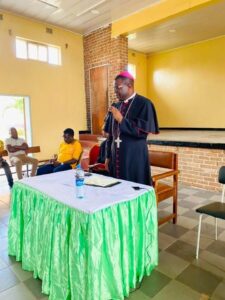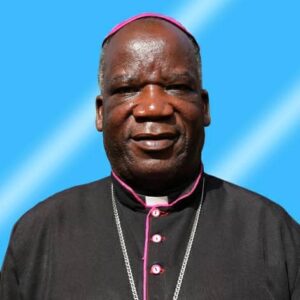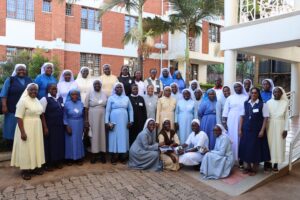KENYA: “Acknowledge Your Unworthiness for the Ministry,” Prelate to Newly Ordained Priests
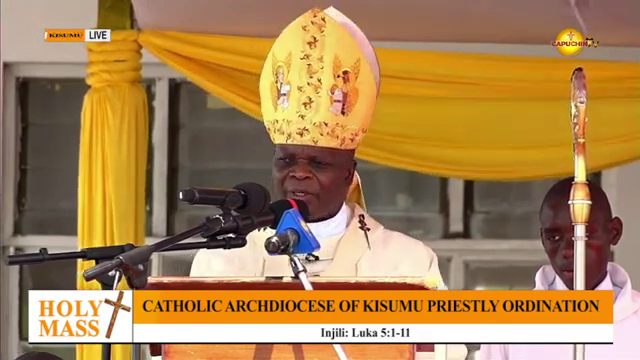
Sr. Jecinter Antoinette Okoth, FSSA
In responding to God’s call and being committed to serving his people as Clerics, the ordained ministers need to acknowledge their imperfections and be more inclined to seek God’s guidance, strength, and wisdom to accomplish a higher purpose, Archbishop Maurice Muhatia Makumba has advised during priestly ordination of five candidates in Kisumu Archdiocese, Kenya.
“My dear brothers to be ordained priests, acknowledge your unworthiness for the mission the Lord is going to give you. Just like ourselves ordained before you, we too are unworthy,” Archbishop Muhatia shared in his homily just before he conferred the Sacrament of Holy Orders to the deacons and warned, “Woe unto you if you don’t acknowledge this unworthiness.”
In his message the Archbishop who doubles as the Chairman for the Kenya Conference of Catholic Bishops (KCCB) pointed out that a priest who does not acknowledge his unworthiness for the ministry cannot be successful, “he will be swallowed up in pride, he will be unavailable, he will become rich with money and poor with grace because he has forgotten that at the center of the ministry and call to service is the Holiness of God.”
Archbishop Muhatia stressed to the Deacons in his homily on Thursday, October 31, that even though we are unworthy servants, “Human unworthiness cannot stop the work of God. On the contrary, God intervenes when human beings in their unworthiness acknowledge the holiness of God as the grace that sanctifies.”
This implies that God’s power and purpose are far greater than human limitations, and his grace, love, and faithfulness allow Him to work through imperfect people, making His presence and power known in ways that inspire faith and trust in Him.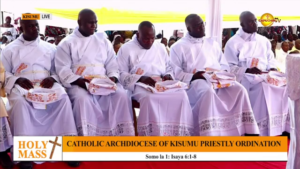
The candidates who were to be ordained Priests included Deacon Cornelius Alwala, Deacon Paul Odhiambo, Deacon Enock Odongo, Deacon Francis Otieno, and Deacon Patrick Odhiambo.
Reflecting on the scriptures from the book of Isaiah, the vision of the Seraphim and six wings, reminded the prophet of God’s unapproachable holiness and the need for purification just before he began his prophetic mission.
“In heaven, things are okay there should be no worry since the Lord is in Charge. We have the angels and the seraphim each of them has six wings,” the Archbishop narrated Isaiah’s vision and continued, “It is worthy to note that each of these angels has six wings: two of them for covering the face two of them for covering the feet and two for flying.”
He explained further, “While the Seraphim are holier than ourselves, human beings, they are aware of God’s holiness and the fact that “the holiness of God cannot be approached uncovered. In fact, it is after the angels are covered face and feet that you hear them announce Holy, Holy, Holy is the Lord of hosts.”
With this narration, the alumni of the Pontifical University of the Holy Cross-Rome emphasized that as the “Angels were in the presence of the holy, who cannot be approached recklessly, aimlessly, unworthily,” priests too should show reverence when offering services to God’s people.
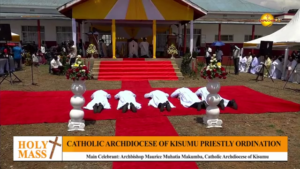 “My dear brothers the five, please let this not miss in your ministry do not forget that the angels Holier as they are, have to cover themselves in the presence of God who is Holy three times,” he said and warned, “Emulate their example don’t be priests full of presumptions, don’t be priests full of negligence, don’t be reckless priests.”
“My dear brothers the five, please let this not miss in your ministry do not forget that the angels Holier as they are, have to cover themselves in the presence of God who is Holy three times,” he said and warned, “Emulate their example don’t be priests full of presumptions, don’t be priests full of negligence, don’t be reckless priests.”
“It is not for nothing that you have to celebrate the Sacraments properly vested. Do not create your own tradition, do not celebrate Mass with a stole only, do not go and anoint the sick with your shirt only. Which God do you serve? Remember anointing the sick is a Sacrament,” he posed.
Additionally, as the seraphim first recognized the Holiness and greatness of God before they began their mission, Archbishop Muhatia advised the Deacons, “Do not begin activity without adoration, do not go for the mission without being in contact with the ‘Holy’ in the sense of prayer. This is not our work, this is God’s work and he is Holy.”
